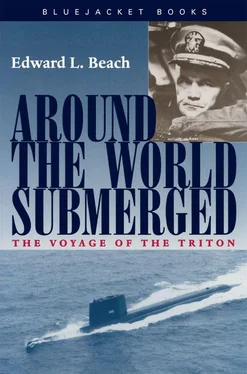All portions of this manuscript have been submitted to the Navy Department for clearance, and each chapter bears the stamp “no objection to publication on grounds of military security.” Over and above this, the entire responsibility for everything which appears in these pages obviously must be my own.
—Edward L. Beach
Captain, United States Navy Mystic, Connecticut
As a small boy, I had the good fortune of being a Navy Junior while living a settled life in a small community, without the frenetic shifts of locale inherent in a Service life. My father, as a Captain, after a long and rewarding career in the Navy, retired when I was four years old to accept the post of Professor of Military and Naval History at Stanford University. He had served the Navy thirty-seven-and-a-half years, and his sea duty had culminated with command of the American flagship in the European war zone during World War I.
During the course of his career, Dad had written thirteen books about naval life, most of them for teen-aged youths, plus several others aimed at a more mature audience. He had made a lifetime avocation of the study of history, with a natural inclination, of course, toward naval history; he had fought in three minor and two major wars (and was fond of saying that the minor ones were far more dangerous, so far as he personally was concerned, than the major). He had commanded one repair ship, two armored cruisers, and two battleships; I was born while he skippered the new “superdreadnaught” New York, in 1918.
My formative youth was spent in Palo Alto, California, where, after his years as a professor at Stanford, Father held the combined posts of City Clerk and Assessor. Among my childhood recollections were the stories Father used to tell about his experiences in the Philippines during and after the Spanish-American War, at the Naval Academy as a midshipman and later as an instructor, and particularly about that dreadful day in 1916 when his ship, the armored cruiser Memphis, was engulfed and destroyed by a tidal wave. The latter was my favorite yarn, and I never wearied of forcing my poor father to repeat all the details of the catastrophe which had blighted his career.
Father said that I would do well to study medicine, but I felt his heart wasn’t in it. My only thoughts were of going to the Naval Academy and becoming, like him, an officer in the US Navy.
The long-sought fulfillment of my ambitions came in 1935. So great was my anticipation I couldn’t understand why Mother was crying when my parents took me to the train station, nor the meaning behind Father’s faraway look. I was then just seventeen years old.
Four years at the Naval Academy had more ups than downs and were most satisfying, but when I graduated on the first of June, 1939, it was with the sad knowledge that Father was slipping away from me. His long and interesting letters had become increasingly difficult to read. The thoughts in them of late had begun to wander, and I noticed that more and more he relived the past, particularly the loss of his old Memphis and the crew members he had had to watch drown.
Father used to say that the place for a young officer was in a big ship; so upon graduation from Annapolis, I applied for the ten thousand ton cruiser Chester. I had been aboard about two months when the war in Europe broke out. Because of a surname beginning early in the alphabet I found myself transferred to the Lea, destroyer number 118.
The Lea was tiny, one-tenth the displacement of the Chester, and she had been “permanently” retired to mothballs some years before. The brass plate on her varnished wooden mast revealed her age as being the same as my own. There were only five officers in the Lea, and I was the most junior. Later on, when the “Third” was transferred, I automatically rose to the high eminence of Fourth, but this, under the circumstances, had little effect on my unofficial title of “George.”
“George,” the traditional name of the most junior officer on board, always served as the ship’s commissary officer, communications officer, ship’s service officer, torpedo officer, gunnery officer, and first lieutenant. In addition, I had to insert a three-year stack of corrections into the ship’s allotment of classified books and pamphlets—a horrendous job—was in charge of the landing party (luckily it seldom got an opportunity to go ashore), stood two four-hour watches a day on the bridge while under way, and while in port stood a twenty-four-hour “day’s duty” every third day (except for a short period when I had the duty every other day).
There was also a Destroyer Officers Qualification Course of some twenty lengthy assignments, which I was required to complete within a year’s time; and the Bureau of Navigation, evidently afraid that Ensigns might neglect their leisure time reading, had decided that we should submit a two thousand word book report each month.
The ship also had a skipper, an engineer, and an executive officer, but I never had time to discover what any of them did.
After two years on the Lea, in September, 1941, a message arrived directing me to submarine school in New London for instruction in submarine duty. By this time, I loved that slender four-stacked race horse of a destroyer, and didn’t want to leave; but my skipper, an old submariner himself, would not send the protest I drafted, so off I went.
The course of instruction at the submarine school, originally six months long, had been curtailed to three by the war emergency, and on December 20, 1941,1 was one of fifty-one graduates who heard the officer in charge of the school deliver a graduation address. In the course of it he said, “Many of you will command your own ships before this war is over.”
None of us believed we could achieve such greatness, but a little later we all noted the other side of the coin, when the first of our group went to eternity in the shattered submarine to which he had reported only a couple of weeks before.
My first submarine was USS Trigger (SS237), then under construction at the Navy Yard, Mare Island, California. During my two years on the Lea, I had finally bequeathed the “George” spot to someone else, but in the Trigger I found myself with that familiar title again. As before, I was greeted by a huge stack of uncorrected confidential and secret publications. The similarity, however, ended here; for Trigger, a first-line ship of war, was designed to operate in an entirely new and unfamiliar medium. The amount of highly technical equipment crammed into her sturdy hull amazed me.
I reported to Trigger on New Year’s Day, 1942, but it wasn’t until May that we arrived at Pearl Harbor. No one in Trigger had ever heard a shot fired in anger. We were all new, green as grass—even the skipper. A feeling of trepidation crept over us as we approached our recently desecrated Pacific bastion.
A short leave during an overhaul period in mid-1943 had great personal significance. I saw Father for the last time, I met Ingrid Schenck, and when I returned to Trigger I became second-in-command.
When I was detached, a year later, Dad had been gone six months and Trigger, now top-ranking submarine in the force, had less than a year to live. With orders to report to Portsmouth, New Hampshire, as Executive Officer of the not-yet-launched submarine Tirante, I used authorized delay time to take a ten-day honeymoon with the girl I had courted during three hectic weeks of leave the year before.
Tirante was a very successful submarine, earning Lieutenant Commander George L. Street, her skipper, a Congressional Medal of Honor. In June of 1945, the prediction of three and one half years was fulfilled when I was given command of my own ship, the Piper. The war, however, was drawing to a close. I strove mightily to get Piper into action, but the bombs of Hiroshima and Nagasaki got there first. Instead of killing and destroying, we rescued six bombed or torpedoed Japanese (we could never determine what had sunk their ship) from the middle of the Sea of Japan, and I have since felt grateful, after all the depth charges and torpedoes, that this, instead of destruction of my fellow man, is my last memory of the war.
Читать дальше












